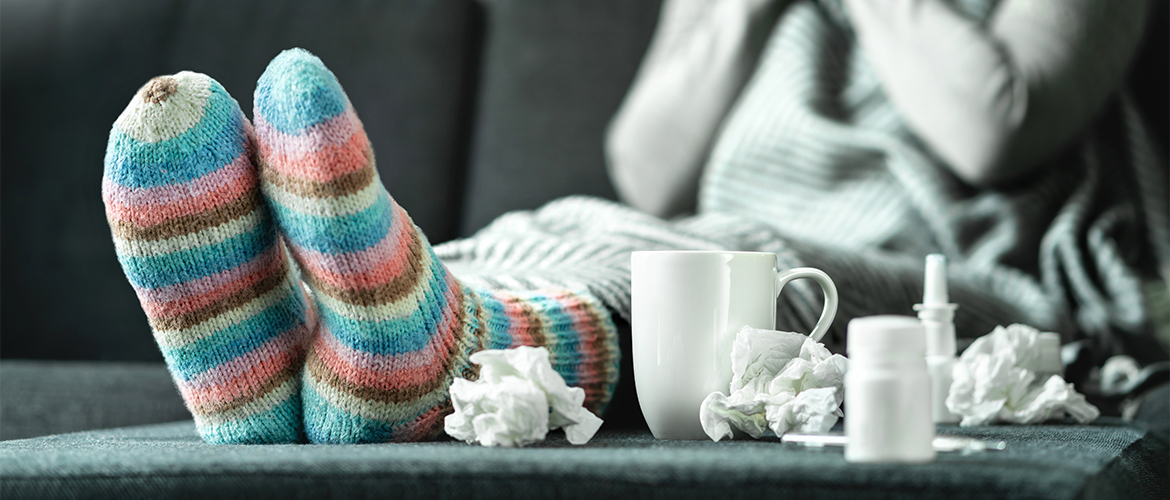August 15, 2024
You wake up and it instantly hits you – that tension in your head, your nose feels clogged up and you can’t seem to clear your throat. You just don’t feel right and wonder if you can push through another busy work day. We often focus so much of our efforts on taking care of others that it can be easy to forget about our own rest and recovery.
When to Take a Sick Day
We work hard throughout the year to save up those vacation days, so when should we sacrifice one to stay home and take a sick day? According to the Centers for Disease Control and Prevention (CDC), all employees should stay home if they are sick until at least 24 hours after their fever is gone.1 You should also consider taking a sick day if you are vomiting, experiencing muscle aches, or if you feel fatigued.
How to Recover from a Cold
Depending on the type of cold you have and the severity of symptoms, antibiotics or antiviral medication may help speed recovery; however, oftentimes a few natural remedies may be all that is needed. There are a few home remedies that can help to loosen mucus, reduce nasal congestion, soothe a scratchy throat and relieve a cough. The key is to start taking action as soon as possible to reduce the duration and severity of your cold. Here's how to get over a cold fast:3
- Get Plenty of Rest: Sleeping helps to activate the immune system by releasing cytokines, which are designed to fight infection. This means that sleep is essential for your body to begin the process of defending itself against any illnesses.4
- Stay Hydrated: Your body needs to hydrate and replace the fluids and electrolytes lost while you were sick. Drinking plenty of fluids helps to thin the mucus in your nose and lungs, which helps your body to fight off the infection. Drinking hot liquids, like tea or broth are also great options and they can help to reduce congestion and loosen up mucus.
- Try a Humidifier: A humidifier adds moisture to the air. You can also try to inhale steam from a bowl of hot water, or in the shower. The humid air can help loosen and thin the mucus in your nose.
- Use Honey to Relieve a Cough: Honey can help relieve cold symptoms due to its soothing properties and antimicrobial effects. Consuming a teaspoon of honey in warm water or tea can soothe a sore throat and provide relief from coughing during a cold.
- Stay Warm and Comfortable: Keep yourself cozy with blankets and warm clothing, especially if you have chills or a fever.
- Watch or Read Something Light: Distract yourself from the discomfort by watching a movie, reading a book, or doing something that doesn't require too much mental effort.
- Eat Healthy Foods: When it comes to food, be smart about what you are putting into your body as it fights off those germs. Try to limit eating sugary and processed foods and focus on healthy fruits and vegetables that are full of nutrients. Learn more about what to eat when you’re sick.
- Get Some Fresh Air: If you're feeling up to it, put on some warm clothes and take a leisurely stroll, or sit on your porch. Just inhaling the fresh air is sure to lift your spirits a bit. If you don't have a porch, or just don't feel like going for a walk, try opening a window for a few minutes. You will get the same benefits without having to leave your house.
It’s best to speak with a health care professional about over-the-counter medicines that can help you feel better. Always use over-the-counter medicines as directed. Remember, they may provide temporary relief of symptoms, but they will not cure your illness.
How to Minimize the Spread of Germs
When you still have a cold and you’re on the road to recovery, it’s important to protect your family members, friends and coworkers from catching your cold. Here are tips to help prevent the spread of germs and keep that pesky cold from making the rounds. The CDC recommends following these steps to minimize infecting others²:
- Cover Your Mouth and Nose: Use a tissue or your elbow to cover your mouth and nose when coughing or sneezing. Dispose of used tissues properly in a waste basket.
- Avoid close contact with people who are sick
- Stay home from work or keep your child out of school for at least 24 hours after the fever is gone (without the use of fever-reducing medicine).
- Follow Vaccination Recommendations: Keep up to date with recommended vaccinations to protect yourself and others from preventable diseases.
- Clean and Disinfect Surfaces: Regularly clean and disinfect frequently touched surfaces like doorknobs, light switches, electronics and countertops.
How Long Does a Cold Last?
The duration of illnesses like the common cold and flu can vary, but typically:
- Common cold symptoms can last for about seven to ten days, with the first few days being the most contagious.
- Flu symptoms usually last for one to two weeks, and individuals may remain contagious for up to a week.
During this time, you may experience signs your body is fighting an infection. These signs can include a sore throat, sneezing, coughing, a runny or stuffy nose, a fever, chills, body aches, headaches, fatigue and loss of appetite. Other signs of infection can include swollen lymph nodes, discoloration of the skin and a red rash. It's important to seek medical attention if your symptoms become severe or worsen.
How To Not Get Sick
Now that you’ve learned how to recover from your illness, here are ways to protect yourself from catching another cold in the future (and hold onto those sick days):
- Consume plenty of antioxidant-rich foods and beverages.
- Try meditation to reduce stress and calm your body, especially during times you’re busy.
- Get plenty of rest – adults should aim for seven to nine hours of sleep per night, while children and teenagers should get eight to ten hours.
With these tips, you’ll be well on your way to surviving that sick day! And if your symptoms just don’t subside or they continue to get worse, MedExpress’s medical team is ready to help — you can schedule an in-person visit, a virtual visit from the comfort of your home or just walk into a MedExpress center at the time that works best for you.
Originally published December 2019. Updated August 2024.
References:
1 CDC. Stay Home When You Are Sick. Last updated April 9, 2019. Accessed July 23, 2019.
2 CDC. Healthy Habits: Coughing and Sneezing. Last updated April 16, 2024 Accessed August 15, 2024.
3 CDC. About Common Cold. Last updated April 24, 2024. Accessed August 15, 2024.
4 Healthline. What to Know About Sleeping When You’re Sick. Last updated March 10, 2020. Accessed August 15, 2023
5 CDC. About Sleep. Last updated May 15, 2024. Accessed August 15, 2023.


